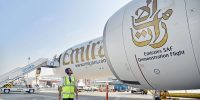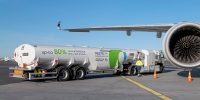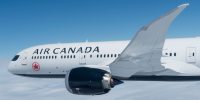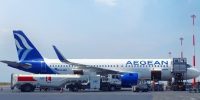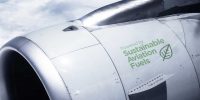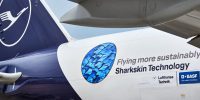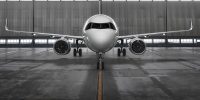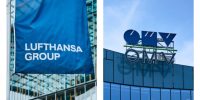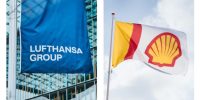Shell International Petroleum Co Ltd and the Lufthansa Group have signed a Memorandum of Understanding (MoU) for exploring the supply of SAF at airports across the globe. The parties intend to agree on a contract for a total supply volume of up to 1.8 million metric tons of SAF starting in 2024, over a term of seven years. Such an agreement would be one of the most significant commercial SAF cooperation in the aviation sector, as well as the largest SAF commitment of both companies to date.
The cooperation would enable the Lufthansa Group to promote the availability, market ramp-up and use of SAF as an essential element for a CO2-neutral future of aviation. The Lufthansa Group is already the largest SAF customer in Europe and aims to remain one of the world’s leading airline groups in the use of sustainable kerosene. The MoU builds on Shell’s ambition to have at least ten percent of its global aviation fuel sales as SAF by 2030.
SAF – the sustainable aviation fuel
SAF is aviation fuel that is produced without the use of fossil energy sources, such as crude oil or natural gas, and show a saving of CO2 compared to conventional kerosene. Various production processes exist and different feedstock are available as energy sources. The current generation of SAF, which saves 80 percent CO2 compared to conventional kerosene, is mainly produced from biogenic residues, for example from used cooking oils. In the long term, SAF can enable virtually CO2-neutral aviation.
The Lufthansa Group has been involved in SAF research for many years, has built up an extensive network of partnerships and is driving forward the introduction of sustainable next-generation aviation fuels in particular. Special focus is placed on the forward-looking power-to-liquid and sun-to-liquid technologies, which use renewable energies or solar thermal energy as energy carriers.
By using SAF, customers of the Lufthansa Group can already fly CO2-neutral today. In addition, they can document their reduced CO2 emissions with audited certificates and have the CO2 savings credited to their individual CO2 balance.
A clear strategy for a sustainable future
The Lufthansa Group assumes responsibility for effective climate protection with a clearly defined path toward CO2 neutrality: By 2030, the company’s own net CO2 emissions are to be halved compared to 2019, and by 2050, the Lufthansa Group wants to achieve a neutral CO2 balance. To this end, the company relies on accelerated fleet modernization, the continuous optimization of flight operations, the use of sustainable aviation fuels and innovative offers for its customers to make a flight CO2-neutral.
The Lufthansa Group is an aviation group with operations worldwide. With 105,290 employees, the Lufthansa Group generated revenue of EUR 16,811m in the financial year 2021. The Lufthansa Group is composed of the segments Network Airlines, Eurowings and Aviation Services. Aviation Services comprises the segments Logistics, MRO, Catering and Additional Businesses and Group Functions. The latter also include Lufthansa AirPlus, Lufthansa Aviation Training and the IT companies. All segments occupy a leading position in their respective markets.
The Lufthansa Group is an aviation company with operations worldwide. It plays a leading role in its European home market. With 105,290 employees, the Lufthansa Group generated revenue of EUR 16,811m in the financial year 2021.
The Lufthansa Group is composed of the segments Network Airlines, Eurowings and the Aviation Services. The Network Airlines segment comprises Lufthansa German Airlines, SWISS, Austrian Airlines and Brussels Airlines. Lufthansa German Airlines also includes regional airlines Lufthansa CityLine and Air Dolomiti as well as Eurowings Discover, the new holiday airline from the Lufthansa Group which started operations in July 2021 and focuses on the touristic segment. Eurowings focuses on short-haul traffic in European point-to-point traffic. Aviation Services particularly includes the Logistics, MRO and Catering segments. The Lufthansa Group also includes the Additional Businesses and Group Functions. This business segment includes in particular Lufthansa AirPlus, Lufthansa Aviation Training and Lufthansa Systems.
The Lufthansa group has committed itself to reduce its carbon footprint to 50% by 2030 and 0% by 2050
Shell is an international energy company with expertise in the exploration, production, refining and marketing of oil and natural gas, and the manufacturing and marketing of chemicals.
Shell uses advanced technologies and take an innovative approach to help build a sustainable energy future. Shell also invests in power, including from low-carbon sources such as wind and solar; and new fuels for transport, such as advanced biofuels and hydrogen.
The information on this page may have been provided by a contributor and no guarantees can be made about the accuracy of any content. Contributors must obtain all necessary licenses and/or ownership rights from the relevant content owner(s) before submitting the same for publication. AIRLINE PARTNERSHIP disclaims all liability arising from the publication of content received from contributors. Links to third party sites shall not be considered an endorsement by AIRLINE PARTNERSHIP. Please refer to our Disclaimer for more details.

Shell International Petroleum Co Ltd and the Lufthansa Group have signed a Memorandum of Understanding (MoU) for exploring the supply of SAF at airports across the globe. The parties intend to agree on a contract for a total supply volume of up to 1.8 million metric tons of SAF starting in 2024, over a term of seven years. Such an agreement would be one of the most significant commercial SAF cooperation in the aviation sector, as well as the largest SAF commitment of both companies to date.
The cooperation would enable the Lufthansa Group to promote the availability, market ramp-up and use of SAF as an essential element for a CO2-neutral future of aviation. The Lufthansa Group is already the largest SAF customer in Europe and aims to remain one of the world’s leading airline groups in the use of sustainable kerosene. The MoU builds on Shell’s ambition to have at least ten percent of its global aviation fuel sales as SAF by 2030.
SAF – the sustainable aviation fuel
SAF is aviation fuel that is produced without the use of fossil energy sources, such as crude oil or natural gas, and show a saving of CO2 compared to conventional kerosene. Various production processes exist and different feedstock are available as energy sources. The current generation of SAF, which saves 80 percent CO2 compared to conventional kerosene, is mainly produced from biogenic residues, for example from used cooking oils. In the long term, SAF can enable virtually CO2-neutral aviation.
The Lufthansa Group has been involved in SAF research for many years, has built up an extensive network of partnerships and is driving forward the introduction of sustainable next-generation aviation fuels in particular. Special focus is placed on the forward-looking power-to-liquid and sun-to-liquid technologies, which use renewable energies or solar thermal energy as energy carriers.
By using SAF, customers of the Lufthansa Group can already fly CO2-neutral today. In addition, they can document their reduced CO2 emissions with audited certificates and have the CO2 savings credited to their individual CO2 balance.
A clear strategy for a sustainable future
The Lufthansa Group assumes responsibility for effective climate protection with a clearly defined path toward CO2 neutrality: By 2030, the company’s own net CO2 emissions are to be halved compared to 2019, and by 2050, the Lufthansa Group wants to achieve a neutral CO2 balance. To this end, the company relies on accelerated fleet modernization, the continuous optimization of flight operations, the use of sustainable aviation fuels and innovative offers for its customers to make a flight CO2-neutral.
The Lufthansa Group is an aviation group with operations worldwide. With 105,290 employees, the Lufthansa Group generated revenue of EUR 16,811m in the financial year 2021. The Lufthansa Group is composed of the segments Network Airlines, Eurowings and Aviation Services. Aviation Services comprises the segments Logistics, MRO, Catering and Additional Businesses and Group Functions. The latter also include Lufthansa AirPlus, Lufthansa Aviation Training and the IT companies. All segments occupy a leading position in their respective markets.
The Lufthansa Group is an aviation company with operations worldwide. It plays a leading role in its European home market. With 105,290 employees, the Lufthansa Group generated revenue of EUR 16,811m in the financial year 2021.
The Lufthansa Group is composed of the segments Network Airlines, Eurowings and the Aviation Services. The Network Airlines segment comprises Lufthansa German Airlines, SWISS, Austrian Airlines and Brussels Airlines. Lufthansa German Airlines also includes regional airlines Lufthansa CityLine and Air Dolomiti as well as Eurowings Discover, the new holiday airline from the Lufthansa Group which started operations in July 2021 and focuses on the touristic segment. Eurowings focuses on short-haul traffic in European point-to-point traffic. Aviation Services particularly includes the Logistics, MRO and Catering segments. The Lufthansa Group also includes the Additional Businesses and Group Functions. This business segment includes in particular Lufthansa AirPlus, Lufthansa Aviation Training and Lufthansa Systems.
The Lufthansa group has committed itself to reduce its carbon footprint to 50% by 2030 and 0% by 2050
Shell is an international energy company with expertise in the exploration, production, refining and marketing of oil and natural gas, and the manufacturing and marketing of chemicals.
Shell uses advanced technologies and take an innovative approach to help build a sustainable energy future. Shell also invests in power, including from low-carbon sources such as wind and solar; and new fuels for transport, such as advanced biofuels and hydrogen.
The information on this page may have been provided by a contributor and no guarantees can be made about the accuracy of any content. Contributors must obtain all necessary licenses and/or ownership rights from the relevant content owner(s) before submitting the same for publication. AIRLINE PARTNERSHIP disclaims all liability arising from the publication of content received from contributors. Links to third party sites shall not be considered an endorsement by AIRLINE PARTNERSHIP. Please refer to our Disclaimer for more details.
Shell International Petroleum Co Ltd and the Lufthansa Group have signed a Memorandum of Understanding (MoU) for exploring the supply of SAF at airports across the globe. The parties intend to agree on a contract for a total supply volume of up to 1.8 million metric tons of SAF starting in 2024, over a term of seven years. Such an agreement would be one of the most significant commercial SAF cooperation in the aviation sector, as well as the largest SAF commitment of both companies to date.
The cooperation would enable the Lufthansa Group to promote the availability, market ramp-up and use of SAF as an essential element for a CO2-neutral future of aviation. The Lufthansa Group is already the largest SAF customer in Europe and aims to remain one of the world’s leading airline groups in the use of sustainable kerosene. The MoU builds on Shell’s ambition to have at least ten percent of its global aviation fuel sales as SAF by 2030.
SAF – the sustainable aviation fuel
SAF is aviation fuel that is produced without the use of fossil energy sources, such as crude oil or natural gas, and show a saving of CO2 compared to conventional kerosene. Various production processes exist and different feedstock are available as energy sources. The current generation of SAF, which saves 80 percent CO2 compared to conventional kerosene, is mainly produced from biogenic residues, for example from used cooking oils. In the long term, SAF can enable virtually CO2-neutral aviation.
The Lufthansa Group has been involved in SAF research for many years, has built up an extensive network of partnerships and is driving forward the introduction of sustainable next-generation aviation fuels in particular. Special focus is placed on the forward-looking power-to-liquid and sun-to-liquid technologies, which use renewable energies or solar thermal energy as energy carriers.
By using SAF, customers of the Lufthansa Group can already fly CO2-neutral today. In addition, they can document their reduced CO2 emissions with audited certificates and have the CO2 savings credited to their individual CO2 balance.
A clear strategy for a sustainable future
The Lufthansa Group assumes responsibility for effective climate protection with a clearly defined path toward CO2 neutrality: By 2030, the company’s own net CO2 emissions are to be halved compared to 2019, and by 2050, the Lufthansa Group wants to achieve a neutral CO2 balance. To this end, the company relies on accelerated fleet modernization, the continuous optimization of flight operations, the use of sustainable aviation fuels and innovative offers for its customers to make a flight CO2-neutral.
The Lufthansa Group is an aviation group with operations worldwide. With 105,290 employees, the Lufthansa Group generated revenue of EUR 16,811m in the financial year 2021. The Lufthansa Group is composed of the segments Network Airlines, Eurowings and Aviation Services. Aviation Services comprises the segments Logistics, MRO, Catering and Additional Businesses and Group Functions. The latter also include Lufthansa AirPlus, Lufthansa Aviation Training and the IT companies. All segments occupy a leading position in their respective markets.
The Lufthansa Group is an aviation company with operations worldwide. It plays a leading role in its European home market. With 105,290 employees, the Lufthansa Group generated revenue of EUR 16,811m in the financial year 2021.
The Lufthansa Group is composed of the segments Network Airlines, Eurowings and the Aviation Services. The Network Airlines segment comprises Lufthansa German Airlines, SWISS, Austrian Airlines and Brussels Airlines. Lufthansa German Airlines also includes regional airlines Lufthansa CityLine and Air Dolomiti as well as Eurowings Discover, the new holiday airline from the Lufthansa Group which started operations in July 2021 and focuses on the touristic segment. Eurowings focuses on short-haul traffic in European point-to-point traffic. Aviation Services particularly includes the Logistics, MRO and Catering segments. The Lufthansa Group also includes the Additional Businesses and Group Functions. This business segment includes in particular Lufthansa AirPlus, Lufthansa Aviation Training and Lufthansa Systems.
The Lufthansa group has committed itself to reduce its carbon footprint to 50% by 2030 and 0% by 2050
Shell is an international energy company with expertise in the exploration, production, refining and marketing of oil and natural gas, and the manufacturing and marketing of chemicals.
Shell uses advanced technologies and take an innovative approach to help build a sustainable energy future. Shell also invests in power, including from low-carbon sources such as wind and solar; and new fuels for transport, such as advanced biofuels and hydrogen.
The information on this page may have been provided by a contributor and no guarantees can be made about the accuracy of any content. Contributors must obtain all necessary licenses and/or ownership rights from the relevant content owner(s) before submitting the same for publication. AIRLINE PARTNERSHIP disclaims all liability arising from the publication of content received from contributors. Links to third party sites shall not be considered an endorsement by AIRLINE PARTNERSHIP. Please refer to our Disclaimer for more details.
Shell International Petroleum Co Ltd and the Lufthansa Group have signed a Memorandum of Understanding (MoU) for exploring the supply of SAF at airports across the globe. The parties intend to agree on a contract for a total supply volume of up to 1.8 million metric tons of SAF starting in 2024, over a term of seven years. Such an agreement would be one of the most significant commercial SAF cooperation in the aviation sector, as well as the largest SAF commitment of both companies to date.
The cooperation would enable the Lufthansa Group to promote the availability, market ramp-up and use of SAF as an essential element for a CO2-neutral future of aviation. The Lufthansa Group is already the largest SAF customer in Europe and aims to remain one of the world’s leading airline groups in the use of sustainable kerosene. The MoU builds on Shell’s ambition to have at least ten percent of its global aviation fuel sales as SAF by 2030.
SAF – the sustainable aviation fuel
SAF is aviation fuel that is produced without the use of fossil energy sources, such as crude oil or natural gas, and show a saving of CO2 compared to conventional kerosene. Various production processes exist and different feedstock are available as energy sources. The current generation of SAF, which saves 80 percent CO2 compared to conventional kerosene, is mainly produced from biogenic residues, for example from used cooking oils. In the long term, SAF can enable virtually CO2-neutral aviation.
The Lufthansa Group has been involved in SAF research for many years, has built up an extensive network of partnerships and is driving forward the introduction of sustainable next-generation aviation fuels in particular. Special focus is placed on the forward-looking power-to-liquid and sun-to-liquid technologies, which use renewable energies or solar thermal energy as energy carriers.
By using SAF, customers of the Lufthansa Group can already fly CO2-neutral today. In addition, they can document their reduced CO2 emissions with audited certificates and have the CO2 savings credited to their individual CO2 balance.
A clear strategy for a sustainable future
The Lufthansa Group assumes responsibility for effective climate protection with a clearly defined path toward CO2 neutrality: By 2030, the company’s own net CO2 emissions are to be halved compared to 2019, and by 2050, the Lufthansa Group wants to achieve a neutral CO2 balance. To this end, the company relies on accelerated fleet modernization, the continuous optimization of flight operations, the use of sustainable aviation fuels and innovative offers for its customers to make a flight CO2-neutral.
The Lufthansa Group is an aviation group with operations worldwide. With 105,290 employees, the Lufthansa Group generated revenue of EUR 16,811m in the financial year 2021. The Lufthansa Group is composed of the segments Network Airlines, Eurowings and Aviation Services. Aviation Services comprises the segments Logistics, MRO, Catering and Additional Businesses and Group Functions. The latter also include Lufthansa AirPlus, Lufthansa Aviation Training and the IT companies. All segments occupy a leading position in their respective markets.
The Lufthansa Group is an aviation company with operations worldwide. It plays a leading role in its European home market. With 105,290 employees, the Lufthansa Group generated revenue of EUR 16,811m in the financial year 2021.
The Lufthansa Group is composed of the segments Network Airlines, Eurowings and the Aviation Services. The Network Airlines segment comprises Lufthansa German Airlines, SWISS, Austrian Airlines and Brussels Airlines. Lufthansa German Airlines also includes regional airlines Lufthansa CityLine and Air Dolomiti as well as Eurowings Discover, the new holiday airline from the Lufthansa Group which started operations in July 2021 and focuses on the touristic segment. Eurowings focuses on short-haul traffic in European point-to-point traffic. Aviation Services particularly includes the Logistics, MRO and Catering segments. The Lufthansa Group also includes the Additional Businesses and Group Functions. This business segment includes in particular Lufthansa AirPlus, Lufthansa Aviation Training and Lufthansa Systems.
The Lufthansa group has committed itself to reduce its carbon footprint to 50% by 2030 and 0% by 2050
Shell is an international energy company with expertise in the exploration, production, refining and marketing of oil and natural gas, and the manufacturing and marketing of chemicals.
Shell uses advanced technologies and take an innovative approach to help build a sustainable energy future. Shell also invests in power, including from low-carbon sources such as wind and solar; and new fuels for transport, such as advanced biofuels and hydrogen.
The information on this page may have been provided by a contributor and no guarantees can be made about the accuracy of any content. Contributors must obtain all necessary licenses and/or ownership rights from the relevant content owner(s) before submitting the same for publication. AIRLINE PARTNERSHIP disclaims all liability arising from the publication of content received from contributors. Links to third party sites shall not be considered an endorsement by AIRLINE PARTNERSHIP. Please refer to our Disclaimer for more details.

Shell International Petroleum Co Ltd and the Lufthansa Group have signed a Memorandum of Understanding (MoU) for exploring the supply of SAF at airports across the globe. The parties intend to agree on a contract for a total supply volume of up to 1.8 million metric tons of SAF starting in 2024, over a term of seven years. Such an agreement would be one of the most significant commercial SAF cooperation in the aviation sector, as well as the largest SAF commitment of both companies to date.
The cooperation would enable the Lufthansa Group to promote the availability, market ramp-up and use of SAF as an essential element for a CO2-neutral future of aviation. The Lufthansa Group is already the largest SAF customer in Europe and aims to remain one of the world’s leading airline groups in the use of sustainable kerosene. The MoU builds on Shell’s ambition to have at least ten percent of its global aviation fuel sales as SAF by 2030.
SAF – the sustainable aviation fuel
SAF is aviation fuel that is produced without the use of fossil energy sources, such as crude oil or natural gas, and show a saving of CO2 compared to conventional kerosene. Various production processes exist and different feedstock are available as energy sources. The current generation of SAF, which saves 80 percent CO2 compared to conventional kerosene, is mainly produced from biogenic residues, for example from used cooking oils. In the long term, SAF can enable virtually CO2-neutral aviation.
The Lufthansa Group has been involved in SAF research for many years, has built up an extensive network of partnerships and is driving forward the introduction of sustainable next-generation aviation fuels in particular. Special focus is placed on the forward-looking power-to-liquid and sun-to-liquid technologies, which use renewable energies or solar thermal energy as energy carriers.
By using SAF, customers of the Lufthansa Group can already fly CO2-neutral today. In addition, they can document their reduced CO2 emissions with audited certificates and have the CO2 savings credited to their individual CO2 balance.
A clear strategy for a sustainable future
The Lufthansa Group assumes responsibility for effective climate protection with a clearly defined path toward CO2 neutrality: By 2030, the company’s own net CO2 emissions are to be halved compared to 2019, and by 2050, the Lufthansa Group wants to achieve a neutral CO2 balance. To this end, the company relies on accelerated fleet modernization, the continuous optimization of flight operations, the use of sustainable aviation fuels and innovative offers for its customers to make a flight CO2-neutral.
The Lufthansa Group is an aviation group with operations worldwide. With 105,290 employees, the Lufthansa Group generated revenue of EUR 16,811m in the financial year 2021. The Lufthansa Group is composed of the segments Network Airlines, Eurowings and Aviation Services. Aviation Services comprises the segments Logistics, MRO, Catering and Additional Businesses and Group Functions. The latter also include Lufthansa AirPlus, Lufthansa Aviation Training and the IT companies. All segments occupy a leading position in their respective markets.
The Lufthansa Group is an aviation company with operations worldwide. It plays a leading role in its European home market. With 105,290 employees, the Lufthansa Group generated revenue of EUR 16,811m in the financial year 2021.
The Lufthansa Group is composed of the segments Network Airlines, Eurowings and the Aviation Services. The Network Airlines segment comprises Lufthansa German Airlines, SWISS, Austrian Airlines and Brussels Airlines. Lufthansa German Airlines also includes regional airlines Lufthansa CityLine and Air Dolomiti as well as Eurowings Discover, the new holiday airline from the Lufthansa Group which started operations in July 2021 and focuses on the touristic segment. Eurowings focuses on short-haul traffic in European point-to-point traffic. Aviation Services particularly includes the Logistics, MRO and Catering segments. The Lufthansa Group also includes the Additional Businesses and Group Functions. This business segment includes in particular Lufthansa AirPlus, Lufthansa Aviation Training and Lufthansa Systems.
The Lufthansa group has committed itself to reduce its carbon footprint to 50% by 2030 and 0% by 2050
Shell is an international energy company with expertise in the exploration, production, refining and marketing of oil and natural gas, and the manufacturing and marketing of chemicals.
Shell uses advanced technologies and take an innovative approach to help build a sustainable energy future. Shell also invests in power, including from low-carbon sources such as wind and solar; and new fuels for transport, such as advanced biofuels and hydrogen.
The information on this page may have been provided by a contributor and no guarantees can be made about the accuracy of any content. Contributors must obtain all necessary licenses and/or ownership rights from the relevant content owner(s) before submitting the same for publication. AIRLINE PARTNERSHIP disclaims all liability arising from the publication of content received from contributors. Links to third party sites shall not be considered an endorsement by AIRLINE PARTNERSHIP. Please refer to our Disclaimer for more details.
Shell International Petroleum Co Ltd and the Lufthansa Group have signed a Memorandum of Understanding (MoU) for exploring the supply of SAF at airports across the globe. The parties intend to agree on a contract for a total supply volume of up to 1.8 million metric tons of SAF starting in 2024, over a term of seven years. Such an agreement would be one of the most significant commercial SAF cooperation in the aviation sector, as well as the largest SAF commitment of both companies to date.
The cooperation would enable the Lufthansa Group to promote the availability, market ramp-up and use of SAF as an essential element for a CO2-neutral future of aviation. The Lufthansa Group is already the largest SAF customer in Europe and aims to remain one of the world’s leading airline groups in the use of sustainable kerosene. The MoU builds on Shell’s ambition to have at least ten percent of its global aviation fuel sales as SAF by 2030.
SAF – the sustainable aviation fuel
SAF is aviation fuel that is produced without the use of fossil energy sources, such as crude oil or natural gas, and show a saving of CO2 compared to conventional kerosene. Various production processes exist and different feedstock are available as energy sources. The current generation of SAF, which saves 80 percent CO2 compared to conventional kerosene, is mainly produced from biogenic residues, for example from used cooking oils. In the long term, SAF can enable virtually CO2-neutral aviation.
The Lufthansa Group has been involved in SAF research for many years, has built up an extensive network of partnerships and is driving forward the introduction of sustainable next-generation aviation fuels in particular. Special focus is placed on the forward-looking power-to-liquid and sun-to-liquid technologies, which use renewable energies or solar thermal energy as energy carriers.
By using SAF, customers of the Lufthansa Group can already fly CO2-neutral today. In addition, they can document their reduced CO2 emissions with audited certificates and have the CO2 savings credited to their individual CO2 balance.
A clear strategy for a sustainable future
The Lufthansa Group assumes responsibility for effective climate protection with a clearly defined path toward CO2 neutrality: By 2030, the company’s own net CO2 emissions are to be halved compared to 2019, and by 2050, the Lufthansa Group wants to achieve a neutral CO2 balance. To this end, the company relies on accelerated fleet modernization, the continuous optimization of flight operations, the use of sustainable aviation fuels and innovative offers for its customers to make a flight CO2-neutral.
The Lufthansa Group is an aviation group with operations worldwide. With 105,290 employees, the Lufthansa Group generated revenue of EUR 16,811m in the financial year 2021. The Lufthansa Group is composed of the segments Network Airlines, Eurowings and Aviation Services. Aviation Services comprises the segments Logistics, MRO, Catering and Additional Businesses and Group Functions. The latter also include Lufthansa AirPlus, Lufthansa Aviation Training and the IT companies. All segments occupy a leading position in their respective markets.
The Lufthansa Group is an aviation company with operations worldwide. It plays a leading role in its European home market. With 105,290 employees, the Lufthansa Group generated revenue of EUR 16,811m in the financial year 2021.
The Lufthansa Group is composed of the segments Network Airlines, Eurowings and the Aviation Services. The Network Airlines segment comprises Lufthansa German Airlines, SWISS, Austrian Airlines and Brussels Airlines. Lufthansa German Airlines also includes regional airlines Lufthansa CityLine and Air Dolomiti as well as Eurowings Discover, the new holiday airline from the Lufthansa Group which started operations in July 2021 and focuses on the touristic segment. Eurowings focuses on short-haul traffic in European point-to-point traffic. Aviation Services particularly includes the Logistics, MRO and Catering segments. The Lufthansa Group also includes the Additional Businesses and Group Functions. This business segment includes in particular Lufthansa AirPlus, Lufthansa Aviation Training and Lufthansa Systems.
The Lufthansa group has committed itself to reduce its carbon footprint to 50% by 2030 and 0% by 2050
Shell is an international energy company with expertise in the exploration, production, refining and marketing of oil and natural gas, and the manufacturing and marketing of chemicals.
Shell uses advanced technologies and take an innovative approach to help build a sustainable energy future. Shell also invests in power, including from low-carbon sources such as wind and solar; and new fuels for transport, such as advanced biofuels and hydrogen.
The information on this page may have been provided by a contributor and no guarantees can be made about the accuracy of any content. Contributors must obtain all necessary licenses and/or ownership rights from the relevant content owner(s) before submitting the same for publication. AIRLINE PARTNERSHIP disclaims all liability arising from the publication of content received from contributors. Links to third party sites shall not be considered an endorsement by AIRLINE PARTNERSHIP. Please refer to our Disclaimer for more details.


